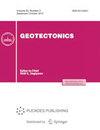Digital models of the deep structure of the Earth’s crust are developed based on the method of gravity modeling, taking the accumulated geophysical data on the Eurasian Basin of the Arctic Ocean into account. The digital models of the basement relief and sedimentary cover thickness in the Eurasian Basin are calculated on the basis of reinterpretation of depth multi-channel reflection seismic cross-sections and 2D gravity modeling. The digital models of the Moho surface relief and the thickness of the Earth’s crust are calculated using the improved 3D gravity modeling method. It is shown that the reason for the deepening of the basement in the Nansen Basin by 1–1.5 km in comparison with the Amundsen Basin is a larger volume of accumulated sedimentary cover in the Nansen Basin, with a similar crustal thickness of ~4.8 km in both basins. The characteristics of the oceanic crust studied on the basis of the obtained digital models reveal a complex 3D variability typical of ultraslow spreading ridges. In the region of the Gakkel Ridge, which was formed at full rates of spreading of less than 12 mm/year, the maximum spread of crustal thicknesses occurs and the tectonic factor dominates over the magmatic one during the accretion of the oceanic crust. This manifests itself in the formation of extended submarine ridges parallel to the amagmatic segments of the ridge.


